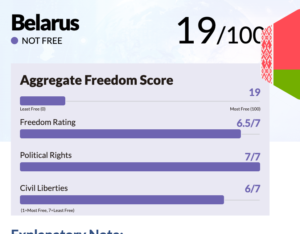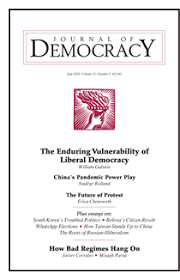 The EU’s top diplomat, Josep Borrell, said the bloc’s credibility on foreign policy “is at stake” after EU foreign ministers again failed to sanction Belarus, Politico reports (HT:CFR). A majority of member states spoke in favor of targeting President Alexander Lukashenko with sanctions, The Wall Street Journal adds. But the move requires unanimous approval, and Cyprus held out in a bid to force EU sanctions on Turkey.
The EU’s top diplomat, Josep Borrell, said the bloc’s credibility on foreign policy “is at stake” after EU foreign ministers again failed to sanction Belarus, Politico reports (HT:CFR). A majority of member states spoke in favor of targeting President Alexander Lukashenko with sanctions, The Wall Street Journal adds. But the move requires unanimous approval, and Cyprus held out in a bid to force EU sanctions on Turkey.
The emergence of a powerful prodemocratic movement came as a shock. Belarus, which became independent in 1991, has long been considered a pro-Soviet bastion, says Lucan Way.
 This democratic uprising was the product of both growing popular discontent and Lukashenka’s own miscalculations, he writes in an advance article from a forthcoming issue of The Journal of Democracy:
This democratic uprising was the product of both growing popular discontent and Lukashenka’s own miscalculations, he writes in an advance article from a forthcoming issue of The Journal of Democracy:
Lukashenka himself came out of nowhere to win the 1994 presidential election thanks in part to the fact that he was underestimated by the establishment as a country bumpkin. In 2020, he in turn gave a critical opening to his main challenger, Sviatlana Tsikhanouskaya, because he did not take women seriously. Indeed, the first serious challenge to Lukashenka’s rule in two decades was directly enabled by misogyny.
In @JoDemocracy’s “How a Dictator Became Vulnerable,” Lucan Way of @UofT reveals the key miscalculations Belarus’s Lukashenka made that put his regime on the brink. A free advance copy is now available on @ProjectMuse: https://t.co/ByNYqr1X0N.
— Journal of Democracy (@JoDemocracy) September 21, 2020
As of this writing in September 2020, Lukashenka’s fate remains unclear, adds Way:
On the one hand, large-scale protests continue despite the regime’s decapitation of the opposition leadership. At the same time, major defections from the regime have largely ceased. Absent a strong push from Russia, Lukashenka is in a strong position to hang on. But even if Belarus’s antirevolutionary uprising fails to oust Lukashenka, it has destroyed the perception that he is invulnerable to opposition challenge. Belarusian democracy may well be on the horizon. RTWT







